A Scientific Foundation for the "New Now”
"BOCOM - Experience Borderless Communication" on September 3rd is the first hybrid and spatially distributed congress to be scientifically evaluated. The focus will be on a holistic view of sustainability - from the event’s ecological sustainability performance all the way to its impact on the participants – in terms of knowledge transfer or networking opportunities, for example.
As a result of the Corona pandemic, the world is experiencing a new level of digitalization, especially in regard to communication and collaboration. In recent months, most of us have gained experiences with virtual and hybrid formats or have tested new technological solutions. However, reflections on which of these approaches work well and, above all, which formats are helpful from the users' point of view, have only just begun.
The hybrid and spatially distributed congress BOCOM, which will be taking place on September 3rd, is the first event of its kind to be accompanied by a research institution - the Fraunhofer Institute for Industrial Engineering IAO - which will put the practical experiences with such new formats on a scientific footing. It is of fundamental importance for the research, which is funded by the German Federal Environmental Foundation, to consider the on-site and online elements separately. This will ultimately enable comparisons of the participants’ experiences and ecological sustainability as well as the evaluation of the hybrid event as a whole.
Through questionnaires, which will be integrated into the event’s program and conducted via the event app, every participant will play an active role in the research process. The study’s aim is to derive concrete recommendations for the agile, participant-focused design of future event formats.
Consistent Participant Focus
BOCOM connects people at different event locations with each other and with virtual attendees from around the world: On-site participants will gather in the central conference hub in Berlin as well as in the decentralized hubs in Amsterdam, Essen and Vienna. Additionally, several speakers will be connected from external locations – Madrid, Paris or Tel Aviv, for example.
What effect will this spatial distribution have on the participants? How will on-site attendees’ delegate journey experiences differ compared to those who will have attended virtually? Important success factors of conferences and congresses, which were previously identified by the innovation network "Future Meeting Space", are knowledge transfer, interaction, network building or disruptive experiences.
What effects will an event design with decentralized locations and virtual participation have on these factors? Several new technological solutions will be used or can be tested in the different labs at BOCOM - from 3D visualizations of locations to conversational interfaces and innovative forms of simultaneous interpreting.
How will participants rate these applications? Lastly, the Corona pandemic has also led to changes in the way people travel and attend events. How will the recent developments affect the motivation to be part of an event like BOCOM – on-site or virtually? The holistic analysis of all these factors will enable us to take a thorough look at the participants’ needs and to derive appropriate recommendations for future action.
Ecological Sustainability: From Resource Consumption to Mobility
Sustainability, like digitalization, is one of the megatrends in the world of work and events. In addition to collecting various data and facts concerning the ecological sustainability performance, such as the utilized resources, BOCOM’s evaluation will also include a corresponding survey of the participants.
According to the different delegate journeys of on-site and virtual participants, participants will receive their own questionnaires. For participants attending in Berlin or in one of the local hubs, the questionnaire’s focus will be on the duration and means of transportation as well as the type and duration of their hotel stay. Remote participants, on the other hand, will be asked with which devices they will have attended BOCOM, which energy sources they will have utilized (conventional or green electricity) or whether they would have travelled to the event, if the possibility of virtual participation had not been provided. The aim of this evaluation, which is carried out by CO2OL and embedded in the research design of Fraunhofer IAO, is to derive concrete strategies on how to optimize the sustainability performance of events.
Strong network of partners
BOCOM grew out of the “Future Meeting Space” (FMS) innovation network, which was founded in 2015 by the GCB German Convention Bureau and the Fraunhofer Institute for Industrial Engineering IAO with the aim of defining technical, organizational and spatial conditions for successful events of the future. The multisite conference format taking place at different locations was one of the first future meeting scenarios identified by the FMS research initiative.
This idea has led to a partnership between the GCB, the Fraunhofer Institute for Industrial Engineering IAO, c4 Berlin (formerly TRIAD) and the visitBerlin Berlin Convention Office to initiate the first test lab for borderless communication in the digital age. Alongside the initiators, the following partners support BOCOM: Accor, AllSeated, deinCHATBOT, Design Offices, gamelab.berlin, IMEX Group, instaroom, KFP Five Star Conference Service, Neumann&Müller Veranstaltungstechnik, nomtek, robo.ai, Siemens, Slido, Ungerboeck, Urbanana, VR Business Club and WeAre.
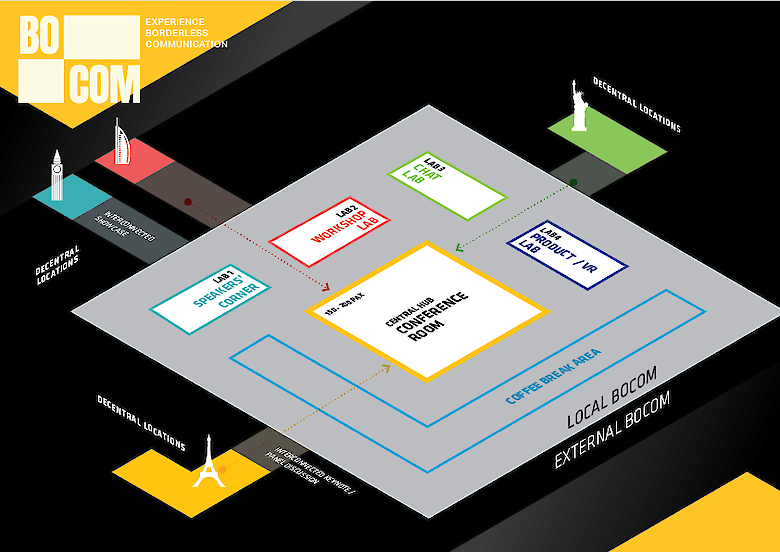
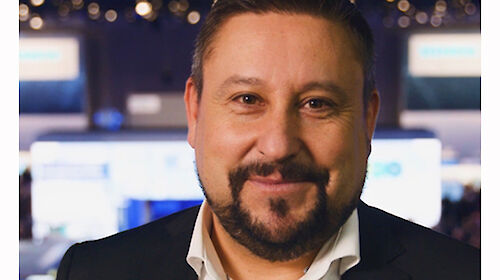 ©
©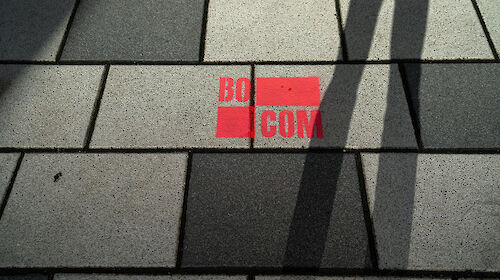 ©
©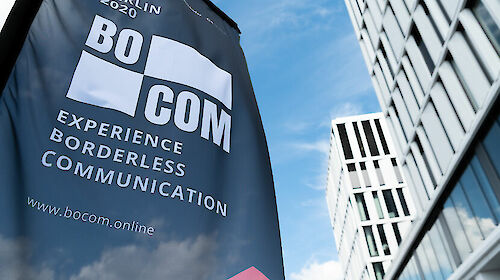 ©
©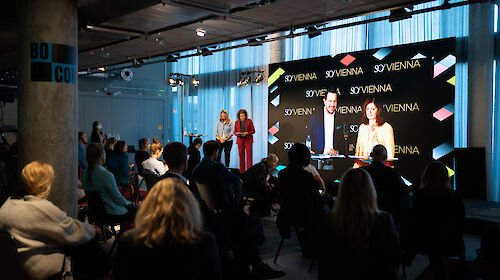 ©
©